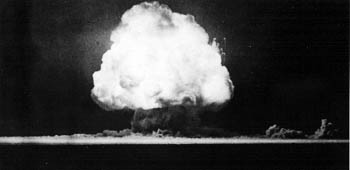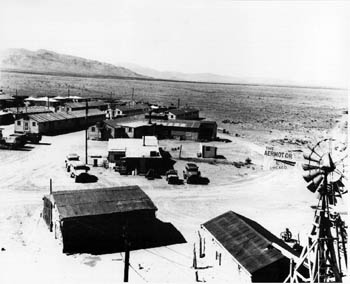![[Metroactive News&Issues]](/gifs/news468.gif)
[ Silicon Valley | Metroactive Home | Archives ]

Blinded by Science: The view 10 seconds after the detonation of the first atomic bomb at the Trinity site in New Mexico on July 16, 1945. Going Nuclear A filmmaker's visit to the site of the first atom bomb explosion, on the 60th anniversary of the deed, sparks the question: How the hell are we still alive? By Daedalus Howell CAN A mushroom cloud have a silver lining? My hawk-eyed cameraman Abe Levy and I had just driven a grueling 16 hours from Los Angeles to the White Sands Missile Base in the desert wasteland of Los Alamos, N.M. We were special guests of the public affairs office, which had granted us a visit to Trinity, the site of the first detonation of the atom bomb on July 16, 1945. It was the eve of the 60th anniversary. The next day would find the historic site swarmed with thousands of people, everyone from Good Sam tourists to candle-toting Buddhist monks from Japan, a swarm that would turn the site into an A-bomb-themed Burning Man. Levy was videotaping the journey for a segment of a show we were then calling, for lack of a better title, The Daedalus Howell Show. I recently screened the footage and was taken aback by a peculiar thing that I had forgotten. I'm standing next to an obelisk erected to commemorate the detonation; Levy says we're running low on tape and encourages me to say something significant as sort of a summary of my relationship to the bomb. But I don't say anything. I just look into the lens, which on the monitor is tantamount to looking into a mirror. I say nothing. This is not my style. I'm a usually a chatty sort who errs toward the bombastic. And yet, I have nothing to say. This sudden muteness, I later surmised, is in my genes. My mutant genes. I inherited this mum braid of nucleotides from my father, the only person I know to have actually witnessed an atomic bomb detonation. He watched it from his living-room window. His address wasn't Main Street, Hiroshima or Nagasaki—it was Las Vegas, and it was 1951, when Mr. Ferguson was by his own account a bright if retiring 8-year-old, in the midst of his second attempt at third grade. "I remember being awakened—'Get up, get up, there's going to be a test.' So we all just sat around the living room looking out the window," recalls Mr. Ferguson of his first atomic bomb. Now in his early 60s, he is comparatively puckish, a codger-in-the-making prone to a wistful drawl whenever he reminisces. "A flash—a couple of seconds later, a boom. Well, OK. This is worth getting up at 0-dark-thirty for? For an 8-year-old kid? No, not really. After that I wouldn't even bother. In fact, I got a reputation for being 'the kid who could sleep through atom bombs.'" Like my father, the scientists and military personnel who had ordered these tests also had no trouble sleeping at night, despite the deadly radioactive cloud they had sent wafting over America. In 1994, the Department of Energy aired its dirty laundry by creating the Office of Human Radiation Experiments, which has this to say about the effect of radiation on DNA: "The effect of the radiation may not be to kill the cell, but to alter its DNA code in a way that leaves the cell alive but with an error in the DNA blueprint." It goes on to explain in its sober, B-film tone that this can result in "mutations in nongerm cells and heritable changes, which result from mutations in germ cells." Germ cells, the site kindly reminds, are sex cells—eggs and sperm—the latter of which was my father's ante to genetic roulette that would become me. Now, admittedly, I'm not a mutant in the popular, comic book sense of the word�I don't have special powers per se, at least not any I'd reveal in public—but I do have what I would characterize as an extra-human ability to obsess. It's an unruly mechanism in my mind that has served me well in some capacities but has just as often driven me to the brink. I can remember when I started obsessing about the bomb. It was Nov. 21, 1983. The fulcrum of the so-called X-Generation, those of us who experienced puberty in the '80s, under the tenure of President Reagan, inherited the Cold War in full bloom, like a hangover from the atomic test debauches of the 1950s. Even its then most popular exegesis, 1983's made-for-TV movie The Day After, sounds like a hangover. "The frightening story of the weeks leading up to and following a nuclear strike on the United States," went the logline on MGM Home Video's anniversary release a couple years back. Everybody in my sixth-grade class had seen the film. They drifted into class the next morning, traumatized, chattering zombies. I went to an experimental school comprised of multigrade "quads" wherein teachers would often lead discussions about our feelings and topics of the day. That morning it was The Day After. The consensus was that it would suck to be nuked. A kid raised his hand and asked, "But what do we do?" Ms. J., our crinkle-eyed instructor, mulled the question, the ubiquitous mantra of the 1950s educational films—"Duck and Cover"—surely echoing in her mind. After a moment, she simply said, "Nothing. There's nothing you can do," and her eyes began to tear. Nuclear nightmares figured heavily in our sixth-grade curriculum. Death-by-nuke seemed inevitable. And we hadn't even had sex yet. I won't attempt to recall the amount of "orgies" scheduled to take place in the neighborhood cemetery to usher in the end of the world or how the graveyard itself came to be eroticized as the symbolic nexus of teenage sex and death. The result surely would have been as ham-handed as a stock footage montage of missile launches cut to the 1812 Overture. More to the point, we had to keep changing the date of the end of the world due to all the no-shows. The end of the world never came and neither did we. President Reagan was making sure of that. "What if free people could live secure in the knowledge ... that we could intercept and destroy strategic ballistic missiles before they reached our own soil ... ?" Reagan asked a wary citizenry during an address to the nation in 1983. The program, of course, came to be known as Star Wars, to the awesome chagrin of George Lucas and a generation of his fans who had incorporated its archetypal precepts into their own blacktop mythology. Not even our ersatz belief systems were immune. When the Cold War ended with the fall of the Berlin Wall in '89 and the threat of nuclear annihilation was ostensibly mitigated, a kind of generation-wide case of post-traumatic stress disorder set in. This may account for why we had to endure the slur "slacker" in the early '90s. No one had expected to live long enough to require a life plan past adolescence.
Trinity and Beyond An hour outside of Socorro, I exhumed my Portage brand "Professional Reporter's Notebook." I had optimistically labeled it "Trinity and Beyond." Inside, a page read: "New Mexico Historic Marker, take a right, four miles to the Stallion Gate. Call Debbie." Debbie worked in the White Sands Missile Range public affairs office. She was tasked with escorting us the 17 miles into the interior of the missile base to Ground Zero. There we would meet and interview Jim Eckles, who helms the PR department. Eckles, donned in summer apparel that included shorts and a panama hat, looked like a man on permanent vacation. His attitude was likewise relaxed and his conversation easy. This was in stark contrast to me who, despite the midsummer heat of 100 degrees or more, insisted on wearing my "action figure" outfit of a jet black blazer and jeans. Moreover, I was trying to keep my mind planted in the moment so as not to soar off into the wild blue yonder of the enormous sky making me feel more inconsequential by the second. The site itself would make sore eyes sorer. It's a dustbowl surrounded by a cyclone fence with an a lava-rock obelisk planted in the middle with a plaque that reads
During the course of our interview, Eckles was kind enough to run off facts and figures. I asked, "Is it still radioactive?" "Yes, but you're exposed to more radiation from cosmic rays while on an airplane than you are here," Eckles said flatly as Levy discreetly looked over the bottom of his shoes as if checking for dog shit. Then in a moment of utter demystifi-cation, Eckles casually said, "Ultimately, It's just a place where something happened." The well spring of my anxieties, if not those of a fair portion of my generation, "just a place where something happened"? "It was a science experiment." Eckles smiled wryly. After a moment he left Levy and me so that we could do some pickup shots without him in the frame. I stood momentarily stultified. I made the mistake of looking into the sky and a sudden unease began to creep over me. I instinctually began the breathing exercises my shrink had taught me in Los Angeles. I fully assumed I was headed toward the mother of all panic attacks, that I was about to completely lose my shit in my own private atomic meltdown. But like the nuclear holocaust promised during my youth, it never came. In the footage, you can hear Levy snap his fingers, and like some midmarket media personality I turn on again: "In the end, it's just a historic landmark. All of these things we've projected upon it and all it is is something that happened a long time ago." Levy whip-pans around and I continue sotto voce, "I can't believe they left us alone at the Trinity site," and then I jokingly pantomime like I'm a vandal shaking a spray can. Unfortunately, the shot is cropped such that it just looks like I'm jerking off out of frame. "You're leaving the Trinity site," Levy reminds, goading me to say something more poignant, more significant before we leave the location for good. I could only shake my head in silence, though my mind flashed to Robert Oppenheimer, the scientist often considered the father of the bomb, and his alleged quote of the Bhagavad-Gita upon the first detonation:
Now I am become death, the shatterer
Waiting that hour that ripens in their
Too overbearing, I thought. Another quote briefly came to mind—the closing stanza of his favorite William Butler Yeats poem, "The Second Coming," which concludes in a remarkably similar cadence:
And what rough beast, its hour come
Slouches toward Bethlehem to be born. Too maudlin. Then I remembered an apocryphal tale about the Movietone newsreel sound engineers who were at a loss to create an appropriate audio track to accompany footage of the billowing explosion. Without any source sound available to them, they improvised. They considered creating a sound effect, they experimented with music, but finally, their deadline looming, settled on silence. Anything else would have been glib, they thought. When Levy suggested again that I muster some order of summary statement, I too went silent. When it came to the bomb, I realized, it might as well be silence, because no one is listening.
Send a letter to the editor about this story to letters@metronews.com. [ Silicon Valley | Metroactive Home | Archives ]
|
From the January 4-10, 2006 issue of Metro, Silicon Valley's Weekly Newspaper.
Copyright © 2006 Metro Publishing Inc. Metroactive is affiliated with the Boulevards Network.
For more information about the San Jose/Silicon Valley area, visit sanjose.com.
